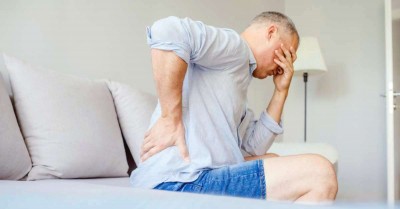6 home remedies for people living with sleep apnea
Warning: Undefined variable $post in /home/dietofli/public_html/wp-content/plugins/code-snippets/php/snippet-ops.php(584) : eval()'d code on line 3
Warning: Attempt to read property "ID" on null in /home/dietofli/public_html/wp-content/plugins/code-snippets/php/snippet-ops.php(584) : eval()'d code on line 3
The estimated reading time is 6 minutes
Warning: Undefined variable $post in /home/dietofli/public_html/wp-content/plugins/oxygen/component-framework/components/classes/code-block.class.php(115) : eval()'d code on line 3
Warning: Attempt to read property "ID" on null in /home/dietofli/public_html/wp-content/plugins/oxygen/component-framework/components/classes/code-block.class.php(115) : eval()'d code on line 3
Sleep apnea can be stressful and irritating. It causes hinders you from getting enough oxygen to your system while you are sleeping. Sleep apnea can cause complications if not treated early enough. While some cases are as a result of other medical conditions, most patients develop the illness due to poor sleeping habits.
Below are some of the home remedies you can use to treat your sleep apnea
Maintain a healthy weight
Specialists recommend that people who suffer from sleep apnea lose weight. Weight gin increases your risk of suffering from sleep apnea and other weight-related issues. It is likely that you are having breathing problems because of weight gain. The more overweight or obese you are, the more likely you are to suffer from sleep apnea. As you gain weight, fat is deposited all around your muscles, including in the throat and this may hinder your breathing capabilities.
Lack of sleep, obesity and sleep apnea are all intertwined in a vicious cycle. The less hours you sleep, the more at risk you are to gaining weight. Staying up all night messes with your digestive system and increases the chances of snacking. When you gain weight, your sleep apnea condition worsens and makes it harder for you to sleep at night.
Here is how you can maintain a healthy weight and reduce your sleep apnea simultaneously
Eat foods rich in fibre
Foods rich in fibre have been linked to improved digestion and weight loss. Most fruits and vegetables have high fibre content. Include lettuce, spinach, nuts, berries, cucumber and bananas in your everyday diet. Fibre induces digestion which empties your stomach and prevents acid reflux which may cause irritation during sleep.
Eat healthy fats
Use essential oils and natural fats in place of processed fats. Natural fats like coconut oil are nutritious to the body and easy to digest. Minimise use of fat in your food and supplement it with fatty foods like avocado and peanuts.
Carbohydrates and proteins
When digested, carbohydrates and protein give your body energy to burn fat and restore your muscles. Include some healthy carbohydrates and proteins in your diet now and then. Ensure you eat your meals a few hours before bedtime to give your body time for digestion.
Avoid alcohol and caffeinated drinks, especially in the evening
Caffeinated drinks such as coffee and cola tend to worsen your sleep apnea. Caffeinated drinks are stimulants, which can last up to 6 hours in your body. When you take coffee in the evening chances are you will stay up for hours and won’t be able to fall asleep until it is too late
In the beginning, alcohol may be a simple solution to your problems. Just a little amount will have you asleep in no time. What you do not know is you are increasing the risk of addiction and weight gain. There is more to it, alcohol causes shallow sleep and frequent movements. For your body to re-energise and rebuild its muscles, you need to be in a state of deep sleep
Create a suitable sleeping environment
Your sleeping environment determines the quantity and quality of your sleep. In darkness, your body produces melatonin, which directs your body to relax, and induce sleep. Loud noises may make you agitated and anxious, keeping you up for most of the night. For a perfect living environment, ensure your curtains are drawn to keep away the light, and all your devices are off for a quite night. you may use blinders and ear muffs when the disturbance is from an external source.
Use a humidifier
Dry air can irritate your respiratory system and body when you are trying to sleep. open your windows or use a humidifier to decongest your airways and encourage better breathing when you are asleep. You can add natural oils like lavender and eucalyptus for added benefits. They have lovely scents and are popular for their anti-inflammatory benefits.
Should dogs sleep in your bed? You may need to reconsider having pets in your bed when you are suffering from seep apnea. With your dog in your bed, You are more likely to sleep lightly and wake up due to movement and noises.
Engage in exercise regularly
When done on a daily basis, exercise will not only help improve the quality of your sleep, but will also help in weight loss. During exercise, your body burns the fat stored in your body and converts it into energy. When all the energy is used up, you get tired and sleepy and your body uses more energy to reconstruct worn out muscles.
The right exercises will reduce your weight and stress levels, stabilise your moods and eventually reduce your sleep apnea issues. Keep in mind that the timing of your exercise will determine how you sleep. Ensure you have a couple of hours between your physical activities and bed time. Exercises like lifting and jogging may keep your adrenaline and blood pressure high for several hours. These conditions make it harder for you to fall asleep. Light exercises like yoga and aerobics stretch your muscles, including the ones around your throat and lungs making it easier to breathe when you sleep.
Avoid heavy meals in the evening.
If you are suffering from sleep apnea, it is best you avoid taking heavy meals especially when it is close to bet time. Meals may not e directly connected to your sleep apnea, but they play a big role in lack of sleep and increasing the risks.
When you take heavy meals, your body needs a few hours for digestion. Going to bed with indigested meals will prompt your body to increase production of digestive juices to speed u the rate of digestion. Most digestive fluids in the stomach are acidic; they lead to acid reflux during your sleep which increases irritability and pain. This plays into the cycle of less sleep, more weight and increases sleep apnea.
Sleeping position
Your sleeping position can have a significant impact on your quality of sleep, especially when you are suffering from a sleeping disorder. Sleeping on your back can be destructive, your tracheae is more closed up and you will find it difficult to breath. Try sleeping on you back to open up the breathing area and keep your tongue from obstructing the airway. Don’t use large pillows on your head as they force your neck to bend and close up the breathing system.














